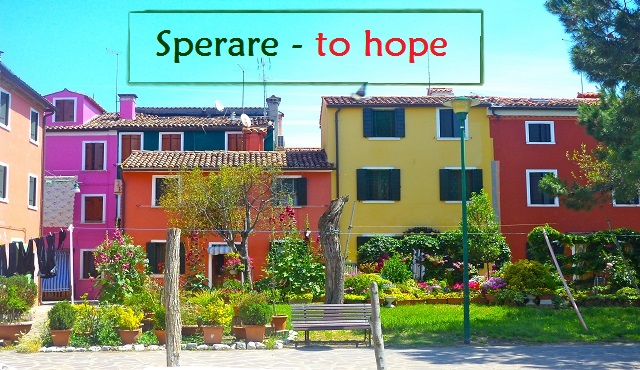I believe that commonly used phrases are the key for how we can all build fluency in any language in a short time.
If we learn how to incorporate commonly used phrases when we speak Italian, we will be able to express important feelings — like our hopes — just as we do in our native language! This will help us with our “email Italian” as well. Read below and you will see what I mean.
This post is the 15th in a series of Italian phrases we have been trying out in our Conversational Italian! Facebook group. If you’d like to read the earlier posts in the series, “Italian Phrases We Use EVERY Day!” CLICK HERE.
Many “commonly used phrases” that allow us to describe our feelings
start with the phrase
“I hope …”
If we are hopeful for someone else, in Italian we must say
“I hope that …“
which will lead us to the Italian subjunctive mood.
See below for how this works.
As we all master these phrases, so will you. Try my method and let me know how it works.
What sentences will you create with these phrases?
Please reply. I’d love to hear from you! Or join our Conversational Italian! group discussion on Facebook.
What I Hope…
In Italian Conversation and Email
When an Italian wants to describe a hope he has, either for himself or someone else, he must use the verb sperare, and this is the verb that will be the topic of our blog today.
Sperare works a bit differently from the “typical” Italian -are verb.
- When using the verb sperare to express a hope one person or a group has for themselves, sperare must be followed by the preposition “di”.
- “Di” will often be followed by a verb in the infinitive form (to see, to start, etc.), which will start the phrase that follows to describe this hope.
| Sperare + di + infinitive verb |
So, “I hope…” would be, “Io spero di…” But, of course, we leave out the subject pronoun in Italian, so the phrase becomes, “Spero di…” “We hope… “would be, “Speriamo di…”
Or, one can just say, “Speriamo!” for, “Let’s hope so!” in order to express a hope that is shared with someone else.
Below are some every day phrases that use the verbs sperare to express a hope for something we would like to see happen. Notice how the subject expresses the hope he or the group has for themselves with the sentence structure provided below. You can add on additional qualifiers at the end of the sentence to describe “when” you hope something may occur.
There are, of course, many more things one can hope for during the course of an ordinary day!
| Spero di “si.” | I hope so. |
| Speriamo! | Let’s hope so. |
| Spero di … vederti di nuovo presto. | I hope… to see you again soon. |
| Lei spera di… viaggiare a Roma d’estate. | She hopes… to travel to Rome in the summer. |
| Speriamo di… iniziare il progetto domani. | We hope… to start the project tomorrow. |
| Spero di… andare a trovare* mia nonna quando ho un giorno libero. | I hope… to visit my grandmother when I have a day free. |
*andare a trovare = to visit a person you know / visitare = to visit a place/a professional for a service
How to Use “Stare” with the Present Tense Subjunctive Mood
You’ve probably already noticed that our example sentences for the verb sperare can become fairly long and express complex ideas. By connecting phrases we can learn to build more meaningful sentences in Italian! But we are not done yet! Because…
- When one uses the verb sperare to express a hope he has for someone else or something else, he must follow the verb with the conjunction “che”, which means “that”. In fact, the word “che” can never be left out of an Italian sentence of this type that is used to link two separate phrases.
- “Che” will then be followed by a verb in the subjunctive mood, which will start the phrase that follows to describe this hope.
| Sperare + che + subjunctive present tense verb |
Just what is the “subjunctive mood”? The subjunctive mood is the type of verb form that Italians use to express a wide range of emotions: hopes (as we have just seen), thoughts, beliefs, doubts, uncertainty, desire or a feeling. There is a long list of phrases that trigger use of the subjunctive mood, and many of these phrases will be the subject of later blogs.
For now, let’s review the commonly used present tense form of the subjunctive mood for the verb stare, which means “to stay” but is used with the meaning of “to be” in situations regarding one’s well-being.
Che is included in parentheses in the first column of our table below as a reminder that these verb forms are typically introduced with the conjunction che. Also, make sure to include the subject pronoun in your sentence after che for clarity, since the singular verb forms are identical.
Practice the subjunctive verbs out loud by saying che, the subject pronoun and then the verb!
| Stare – to stay (to be) Present Subjunctive Mood |
||
| (che) io | stia | I stay (am) |
| (che) tu | stia | you (familiar) stay (are) |
| (che) Lei (che) lei/lui |
stia | you (polite) stay (are) she/he stays (is) |
| (che) noi | stiamo | we stay (are) |
| (che) voi | stiate | you all stay (are) |
| (che) loro | stiano | they stay (are) |
Example Phrases Using “Stare” in the Present Tense Subjunctive Mood
Sentences using stare (to stay/to be) in the subjunctive mood come up very commonly in this modern life in conversation, and especially in email. In this era of technology, it seems like not a day goes by without an email being sent and received. The old formalities of opening and closing a letter have returned!
After the greeting in an email, especially if there has not been recent communication, it is customary to mention a hope that all is well with friends and family. Here is a case for the subjunctive!
To follow are some examples when the Italian subjunctive mood in the present tense might be used in conversation during daily life. Notice that the English translation is the same for the present tense and the Italian subjunctive forms used in the sentences below.
| Present Tense Phrase | Present Tense Subjunctive Phrase | ||
| Tu stai bene. | You (familiar) are well. | Spero… che tu stia bene. |
I hope… that you (familiar) are well. |
| Lei sta bene. | You (polite) are well.
She is well. |
Spero… che Lei/lei stia bene. | I hope… that you (polite) are well. I hope that she is well. |
| Lui sta bene. | He is well. | Spero… che lui stia bene. |
I hope… that he is well. |
| La famiglia sta bene. | The family is well. | Spero… che la tua famiglia* stia bene. | I hope… that the family* is well. |
| Tutti stanno bene. | Everyone/Everybody is well. |
Spero… che tutti stiano bene. |
I hope… that everyone/everybody is well. |
*Famiglia = family and is a collective noun and takes the third person singular.
Remember these phrases and the Italian subjunctive mood, and I guarantee you will use them every day!
 Fra Noi Embrace Your Inner Italian
Fra Noi Embrace Your Inner Italian






